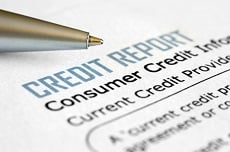After you fall into unmanageable debt your credit score will begin to suffer. Missing payments and making payments less than minimum will negatively affect your credit. Filing bankruptcy is the first step to take toward becoming debt free and to start the credit rebuilding process.
Monitoring and managing your credit after bankruptcy will help you develop or build on your financial management skills, making rebuilding credit and maintaining it when it is rebuilt simpler. If you follow these tips, you can rebuild your credit within one to three years on average.
#1 - Review Your Credit Report
 Review your credit report annually. Doing this will help you identify issues or inaccuracies that may affect your score and reputation. Federal law states that you may have one free copy of your credit report each year. You can access this free credit report at www.annualcreditreport.com or by calling 1.877.322.8228. If you find any errors, write to the credit bureau from which you received the report and provide correct information.
Review your credit report annually. Doing this will help you identify issues or inaccuracies that may affect your score and reputation. Federal law states that you may have one free copy of your credit report each year. You can access this free credit report at www.annualcreditreport.com or by calling 1.877.322.8228. If you find any errors, write to the credit bureau from which you received the report and provide correct information.
After you have been granted a discharge in your bankruptcy case you should follow up with the credit bureau to ensure all new information is accurately documented. You should send the bureau a copy of your discharge notice and the schedules of creditors if you find any incorrect information during your follow-up.
#2 - Begin Budgeting
Regardless of your circumstances for falling into unmanageable debt and using bankruptcy to help you out, you should set a realistic household budget. Get a complete picture of your household income so you know where your spending boundaries lie. Next, take into account all of your necessary expenses – food, gas, education, house payments, insurance, etc. This will give you a clear understanding of how much money you NEED, and when subtracted from your household income you will have excess dollars for saving or recreation spending.
Following an accurate and reliable budget is key to rebuilding your credit.
To learn more about how to set a household budget, check out a few of our resources:
- How to Start a Household Budget After Bankruptcy
- Seven Budgeting Tips for Life After Bankruptcy
- When Life After Bankruptcy Starts, Start and Stick to a Budget
#3 – Obtain Credit
Begin to obtain credit by applying for ONE credit card. You may be surprised how many offers you will receive despite the fact that you just filed bankruptcy. Closely examine the terms, interest rates, annual fees, etc. before choosing one creditor to ask for your first line of credit. It is best practice to take on credit slowly to ensure you can effectively manage it.
Once you have a credit card, make a small purchase each month (e.g. $25) and pay it off as soon as the bill arrives. When you pay the balance due and avoid interest charges, you show prospective creditors that you can manage your account.
Eventually, as your credit score builds, you should carry one or two bank credit cards, possibly one department store card and one gasoline card. Try to avoid charging everything on your bank credit card and not using your department or gasoline card; find a good balance you can manage. When creditors look in your credit file, they want to see that you can handle more than one credit account at a time.
To learn more about obtaining credit after bankruptcy, read our blog Applying for Credit After Bankruptcy.
#4 - Handle Your Credit Responsibly
Any late or missed payments are a detriment to rebuilding your credit and proving your reliability to creditors. Success with your first line of credit is vital because it will prove you are responsible and able to bounce back from financial troubles.
Pay everyone you borrow money from back in full, on time. Doing this for an extended period of time will show other creditors you are able to manage your finances. Creditors are not required to report your payment history, but you can ask your current creditors to report your timely payments so you can continue rebuilding your credit.
To learn more about to handle credit responsibly, read our blog How to Manage Credit Cards After Bankruptcy Discharge.
#5 - Credit Beyond Credit Cards
Apply for a small loan at your bank after you have spent time making full and timely payments on your credit card(s). Paying that loan on time will also improve your credit score. As you continue to rebuild your credit, lenders will become more apt to lend you larger amounts of money with better terms.
Sign up for our eNewsletter to receive more credit building tips and additional finance management and debt solution advice.



